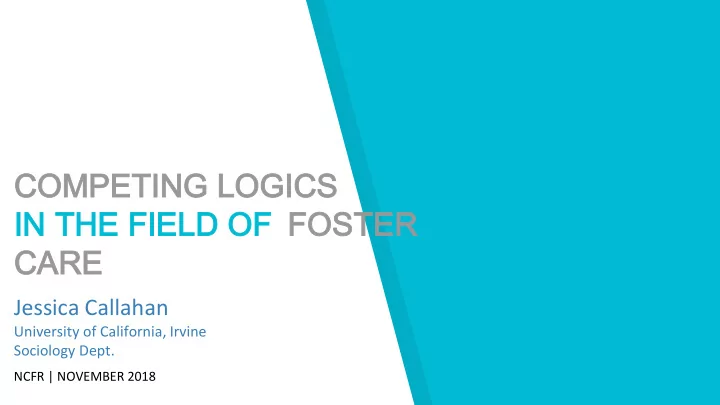

COMPETING LOGICS COMPETING LOGICS IN THE FIELD OF IN THE FIELD OF FOSTER FOSTER CARE CARE Jessica Callahan University of California, Irvine Sociology Dept. NCFR | NOVEMBER 2018
FOSTER CARE AS AN FOSTER CARE AS AN ALTERNATIVE FORM ALTERNATIVE FORM OF OF FAMILY MAKING FAMILY MAKING Assisted Adoption Foster Care Reproduction • sperm/egg • international • group homes donation • domestic • foster homes • in vitro • private • foster-to- fertilization • public adopt homes • surrogacy 2
RESEARCH QUESTIONS RESEARCH QUESTIONS Broadly : how do interactions with institutions shape understandings of what a “good” parent is? Specifically : how do foster parents make sense of their decision to make a family through foster care, rather than by other means? 3
METHODS AND ANALYSIS METHODS AND ANALYSIS ▸ 17 interviews with Texas foster parents ▹ 12 women, 3 men ▹ 7 had biological children, 8 did not ▸ Open, inductive coding 4
COMPETING LOGICS COMPETING LOGICS FROM THE STATE FROM THE STATE ▸ Children should not languish Reunification in the system for years while ▸ It’s important for children to waiting for their parents to remain connected to their bio make changes; adoption families; reunification should should occur after a be prioritized reasonable effort has been made to reunify the original family Adoption 5
LOVE LOVE DOESN’T MAKE DOESN’T MAKE A “GOOD” PARENT A “GOOD” PARENT • Past studies found adoptive parents relying on “love” narratives to make sense of their choice to adopt • My interviewees differed: they emphasized their bureaucratic competency rather than their love for their foster children 6
UNDERSTANDING HOW PEOPLE UNDERSTANDING HOW PEOPLE INTERACT WITH INTERACT WITH FAMILY FAMILY -MAKING MAKING INSTITUTIONS INSTITUTIONS IS IMPORTANT IS IMPORTANT ▸ What are the implications of bureaucratic competency being connected to new modes of family making? 7
Recommend
More recommend